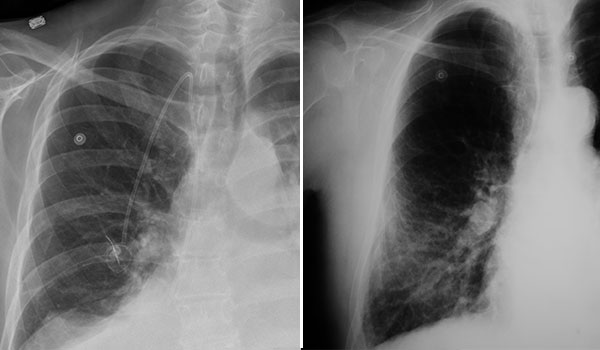Mesothelioma Misdiagnosis
Misdiagnosis of mesothelioma occurs when a doctor mistakes mesothelioma symptoms for another cancer or condition. Pleural mesothelioma can be misdiagnosed as pneumonia or COPD. To avoid a mesothelioma misdiagnosis, those with known asbestos exposure and symptoms should get a specialist’s opinion.
Written by Karen Selby, RN • Edited By Walter Pacheco • Medically Reviewed By Dr. Raja Michael Flores
Asbestos.com is the nation’s most trusted mesothelioma resource
The Mesothelioma Center at Asbestos.com has provided patients and their loved ones the most updated and reliable information on mesothelioma and asbestos exposure since 2006.
Our team of Patient Advocates includes a medical doctor, a registered nurse, health services administrators, veterans, VA-accredited Claims Agents, an oncology patient navigator and hospice care expert. Their combined expertise means we help any mesothelioma patient or loved one through every step of their cancer journey.
More than 30 contributors, including mesothelioma doctors, survivors, health care professionals and other experts, have peer-reviewed our website and written unique research-driven articles to ensure you get the highest-quality medical and health information.
About The Mesothelioma Center at Asbestos.com
- Assisting mesothelioma patients and their loved ones since 2006.
- Helps more than 50% of mesothelioma patients diagnosed annually in the U.S.
- A+ rating from the Better Business Bureau.
- 5-star reviewed mesothelioma and support organization.
Testimonials
My family has only the highest compliment for the assistance and support that we received from The Mesothelioma Center. This is a staff of compassionate and knowledgeable individuals who respect what your family is experiencing and who go the extra mile to make an unfortunate diagnosis less stressful. Information and assistance were provided by The Mesothelioma Center at no cost to our family.LashawnMesothelioma patient’s daughter
How to Cite Asbestos.com’s Article
APA
Selby, K. (2024, April 18). Mesothelioma Misdiagnosis. Asbestos.com. Retrieved April 18, 2024, from https://www.asbestos.com/mesothelioma/misdiagnosis/
MLA
Selby, Karen. "Mesothelioma Misdiagnosis." Asbestos.com, 18 Apr 2024, https://www.asbestos.com/mesothelioma/misdiagnosis/.
Chicago
Selby, Karen. "Mesothelioma Misdiagnosis." Asbestos.com. Last modified April 18, 2024. https://www.asbestos.com/mesothelioma/misdiagnosis/.
Why Is Mesothelioma Misdiagnosed?
Malignant mesothelioma is a rare and complex cancer. Most physicians and many oncologists rarely see it and don’t fully understand how it works. It takes a team of doctors familiar with the cancer to accurately diagnose mesothelioma.
Medical professionals often misdiagnose mesothelioma as another cancer or a less serious condition. This can depend on where the tumors form in the body. When tumors begin to grow and spread, they cause symptoms that mirror those of other conditions.
In a recently published case report, doctors diagnosed a woman with primary pericardial mesothelioma that had unusual features. Primary pericardial mesothelioma is very rare, so few doctors have experience with its diagnosis or treatment. Symptoms of PPM can mimic a variety of heart conditions and other diseases. After careful examination of her CT scans and a surgical biopsy, doctors were able to diagnose her correctly.
Common Misdiagnoses of Pleural Mesothelioma
Early symptoms of pleural mesothelioma resemble symptoms of emphysema or pneumonia. Pleural mesothelioma affects the lungs and can cause pleural effusion — a buildup of fluid around the lungs — and difficulty breathing. Chronic lung diseases, infections and lung cancer can all cause the same symptoms.
- Adenocarcinoma (glandular tissue cancer)
- Chronic obstructive pulmonary disease
- Emphysema
- Influenza (flu)
- Lung cancer
- Pneumonia
According to a Journal of Thoracic Oncology study, almost 50% of mesothelioma patients receive a misdiagnosis. This study included more than 1,000 mesothelioma patients. More than 80% of stage 1 mesothelioma patients received an incorrect diagnosis. A correct diagnosis usually comes from a mesothelioma specialist.
Common Misdiagnoses of Peritoneal Mesothelioma
Doctors may misdiagnose peritoneal mesothelioma as many different conditions involving the abdomen. A 2021 case study detailed an example of a peritoneal mesothelioma misdiagnosis. A man with previous asbestos exposure had a rare case of benign multicystic peritoneal mesothelioma. Doctors initially misdiagnosed the condition as a hydatid cyst found in the liver and abdominal cavity.
- Gallstones
- Hernia
- Irritable bowel syndrome
- Other abdominal cancers
- Ovarian cancer
If you have a history of asbestos exposure and are experiencing common mesothelioma symptoms, it is important to find a specialist who can quickly give you or confirm a peritoneal mesothelioma diagnosis. These doctors can tailor an effective treatment regimen to fit your personal needs.
Common Misdiagnoses of Pericardial Mesothelioma
Pericardial mesothelioma is a rare form of mesothelioma that affects the sac surrounding the heart. It can cause a pericardial effusion — a buildup of fluid around the heart. This and other symptoms mimic many different heart conditions and heart tumors.
- Angiosarcoma
- Cardiac tamponade
- Cardiomyopathy
- Congestive heart failure
- Constrictive pericarditis
- Coronary artery disease
- Heart disease
- Intra-atrial myxoma
- Metastatic lung cancer
- Tuberculous pericarditis
Like all forms of mesothelioma, blood tests, X-rays or CT scans cannot accurately diagnose pericardial mesothelioma. Instead, diagnosis requires a biopsy to collect cancer cells and analyze them in a laboratory. Mesothelioma is rare and can be very difficult to diagnose, but doctors should suspect it in people with known asbestos exposure.
How Can a Mesothelioma Misdiagnosis Affect You?
Misdiagnosis of mesothelioma can delay treatment, which can be deadly. Delaying treatment allows the mesothelioma to continue growing and spreading. Larger tumors and more metastases mean a more advanced stage of mesothelioma with a worse prognosis.
Early diagnosis is essential to improve treatment outcomes. Late diagnosis at a more advanced stage limits your available treatment options. Misdiagnosis can also lead to receiving ineffective treatments for conditions that you don’t have. In some cases, the wrong treatment can be harmful.
“It’s terrible watching someone go through this. I saw what my mom went through. It just seemed like compared to most diseases, her doctors didn’t have any real answers.”Rebecca C.
Misdiagnosis also increases the financial burden that mesothelioma patients and their families bear. The cost of doctor visits, laboratory tests, imaging tests, procedures and surgeries adds up quickly. Misdiagnosis means that you need even more uncomfortable and expensive tests and procedures.
Delayed mesothelioma diagnosis leads to a worse prognosis and reduced survival rate. Mesothelioma is difficult to diagnose and treat. Long-term mesothelioma survival rates are low but they improve with accurate early diagnosis and treatment.
Do You Suspect a Mesothelioma Misdiagnosis?
If you suspect you were misdiagnosed, seek a second opinion. If you’re not satisfied with a doctor’s diagnosis because it doesn’t explain the symptoms you’re experiencing or if treatment isn’t working, then don’t be shy about looking for another explanation. Doctors make mistakes, especially when it comes to accurately diagnosing mesothelioma.
If you’re concerned about the possibility of mesothelioma, seek out a doctor with experience diagnosing and treating it. There are mesothelioma experts across the country who have years or decades of experience working with patients and can provide a mesothelioma second opinion.
Don’t take no for an answer. Pay attention to your body.Kasie ColemanDiagnosed with peritoneal mesothelioma in 2010
If you know that you have a history of asbestos exposure or have worked in an industry with potential asbestos exposure, you should ensure that your doctor knows about it. Mesothelioma is rare, but it occurs at a much higher rate in people with asbestos exposure. If you’re concerned about mesothelioma, tell your doctor.
One of the most important things you can do as a patient is to ask as many questions as you can about your condition. Even more importantly, don’t stop asking questions until you’re satisfied with the answers. Ultimately, you’re responsible for making choices about your medical care. Be sure that you can make decisions based on all available information.
Getting a Second Opinion After a Mesothelioma Diagnosis
People already diagnosed with mesothelioma should get a second opinion from an expert. This includes having a pathologist with mesothelioma experience confirm the diagnosis. The average oncologist doesn’t have enough experience to accurately diagnose and treat this cancer.
Mesothelioma specialists understand how difficult it is to correctly diagnose the disease. You need to find someone who knows what tests can help diagnose or rule out mesothelioma and how to interpret the results.
Even if you have been correctly diagnosed with mesothelioma, oncologists without mesothelioma experience may get the stage wrong. Accurate staging is essential to ensure you get the proper treatment that is most effective for your individual circumstances.
If you have mesothelioma, a second opinion is crucial for getting the right treatment. Don’t hesitate to seek out a mesothelioma specialist for the best possible care.
How Getting a Second Opinion Can Help You
An accurate diagnosis is necessary to ensure you receive the proper treatment. The type of mesothelioma and its stage determine which treatment options are most effective. Additional factors, such as other medical conditions, can also affect treatment options.
The sooner there is confirmation of your diagnosis, the sooner a specialist can develop a treatment plan. Patients diagnosed in an early stage usually qualify for more aggressive treatment options. Aggressive treatment has a higher chance of extending life expectancy for mesothelioma patients.
A diagnosis of mesothelioma is rarely good news. Doctors diagnosed Darlene Micciche with advanced pancreatic cancer, but after seeking a second opinion, she correctly received a peritoneal mesothelioma diagnosis. “For two weeks, I thought I had stage 4 pancreatic cancer,” Micciche said. “When they finally told me it was mesothelioma, I actually felt relieved. That was better than the diagnosis we originally thought I had.” An accurate diagnosis allowed her to get the right surgery and chemotherapy.
A mesothelioma second opinion may prevent you from getting the wrong diagnosis and treatment. It can also confirm your original diagnosis. If nothing else, a second opinion can help give you peace of mind.
How Do Specialists Diagnose Mesothelioma?
The process of diagnosing mesothelioma often starts with X-rays and other imaging tests such as CT and MRI scans. Ultimately, a biopsy of the tumor is necessary to provide an official diagnosis. Examination of biopsied tissue determines if it is cancer and, if so, what kind.

Symptoms are not enough to diagnose mesothelioma on their own.. For example, fluid buildup around the lungs or in the abdomen, though commonly seen in mesothelioma, can point to many other diseases as well. However, if fluid buildup recurs after treatment, more tests should follow.
The only way to confirm a mesothelioma diagnosis is through a biopsy of suspected cancer tissue. Performing pathology tests on the biopsy sample can confirm or deny the presence of mesothelioma cancer cells. This step is essential to avoid misdiagnosis as well as help determine the most effective treatment.
This is not a knock on anyone, but many doctors only see one or two cases a year, and you don’t want to be on someone’s learning curve. Find the best. Find someone who sees this a lot.Dr. Abraham LebenthalThoracic surgeon and mesothelioma specialist
Mesothelioma can be indistinguishable from other cancers without a proper biopsy. For example, a 2019 case report described a pleural mesothelioma patient who presented with cancer growth resembling lung cancer. Proper pathology testing revealed that it was mesothelioma and not a form of lung cancer.










